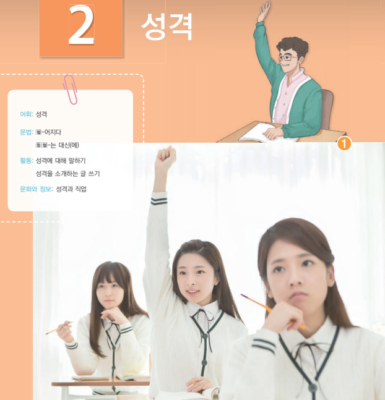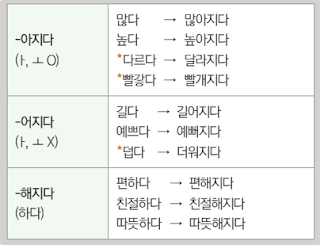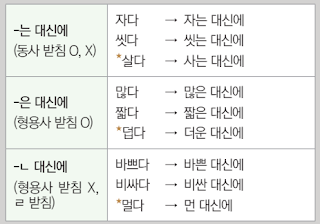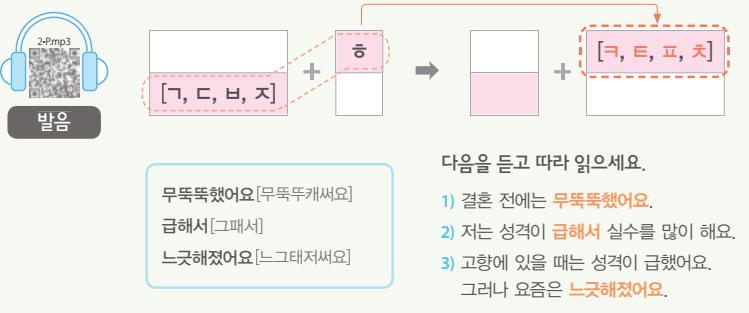
KIIP 3 (New book] – 2과: 성격 Personality
Page 26:
□ 외향적이다: be extroverted
□ 내성적이다: be introverted
□ 적극적이다: be active
□ 소극적이다: be passive
□ 꼼꼼하다: meticulous; elaborate; careful
□ 덜렁거리다: be careless
□ 다정하다: kind, friendly, warm-hearted and affectionate.
□ 무뚝뚝하다: blunt, stiff, brusque
□ (성격이) 느긋하다: comfortable; relaxed; carefree
□ (성격이) 급하다: impatient, urgent, hurried
Page 27~28
1. A + 아/어지다: click here (Page 27)
-아/어지다 expresses a change in state over time and means ‘become’ or ‘turn’ in English. If the stem ends in the vowel ㅏ or ㅗ, then -아지다 is used. Otherwise, -어지다 is used. As for verbs ending in 하다, the form changes to 해지다.

반장님: 잠시드 씨, 예전에는 실수를 자주 했는데 요즘은 많이 꼼꼼해졌네요.
Mr. Jamshid used to make a lot of mistakes, but these days you’ve become very meticulous.
잠시드: 감사합니다. 아직 배울 게 많아요.
Jamshid: Thank you. I still have a lot to learn.
•가: 아이 성격이 어때요?
What is your child’s personality like?
나: 태권도를 배운 후부터 많이 활발해졌어요.
He became very active after learning Taekwondo.
•고향에 있을 때는 성격이 느긋했어요. 한국에 와서 많이 급해졌어요.
When I was in my hometown, I was easygoing. After coming to Korea, it became very urgent.
•이제는 한국 생활에 많이 익숙해졌어요.
I got used to living in Korea now.
2. A + (으)ㄴ 대신에, V+ 는 대신에: Click here

안젤라: 일요일에도 출근해요?
이링 : 네, 일요일에 일하는 대신에 월요일에는 쉬어요.
Angela: Do you go to work on Sunday?
Ling Lee: Yes, instead of working on Sunday, I take a break on Monday.
•가: 우리 아이는 간단한 숙제도 시간이 오래 걸려요.
나: 시간이 오래 걸리는 대신에 실수가 없으니까 걱정하지 마세요.
•부모님을 자주 찾아 뵙지 못하는 대신에 전화를 자주 드려요.
Instead of not seeing my parents often, I often call them.
•일이 많은 대신에 다양한 경험을 쌓을 수 있어서 좋아요
I’m happy that I can gain various experiences instead of having a lot of work
말하기 (Page 29)
후엔: 고천 씨, 무슨 일이 있어요? 얼굴이 안 좋아 보여요.
고천: 우리 아이 성격 때문에 고민이에요.
후엔: 성민이 성격요?
고전: 네, 애가 저를 닮아 성격이 많이 내성적이거든요. 한국에 온 지 두 달이 넘었는데 학교 친구들과 아직 못 어울리는 것 같아요.
후엔: 그래요? 걱정되시겠어요. 그럼 아이한테 동아리나 봉사 활동을 시키면 어떨까요? 우리 아이는 봉사 활동을 한 후부터 성격이 외향적이고 밝아진 것 같아요.
고전: 그렇군요. 이따 집에 가서 우리 아이하고 얘기해 볼게요. 고마워요.
Huen: Gocheon, what’s going on? Your face doesn’t look good.
Gocheon: I’m worried about my child’s personality.
Huen: Sungmin’s personality?
Gocheon: Yes, he resembles me and has a very introverted personality. It’s been over two months since I came to Korea, but he still can’t seem to hang out with my schoolmates. Huen: Would you be worried? So, what if you give your child a club or volunteer activity? I think my child’s personality has become outgoing and bright after volunteering.
Gocheon: Alright. I’ll go home later and talk to my child. Thank you.
닮다: resemble; copy; follow
내성적: being introverted
넘다: go over
동아리: club
봉사: volunteer
외향적: being extroverted
듣기 (Page 30)
애 나(여): 제이슨 씨, 다음 주 ‘장기자랑 대회’에서 노래할 거예요?
제이슨(남): 네. 무슨 노래 부를지도 이미 정했는데요. 애나 씨도 같이 해 보는 게 어때요?
애 나(여): 저는 성격이 소극적인 편이어서 다른 사람들 앞에 나서는 걸 안 좋아해요. 저도 제이슨 씨 같은 성격을 가졌으면 좋겠네요.
제이슨(남): 저도 예전에는 조용하고 내성적이었어요. 그런데, 한국에 와서 낯선 생활에 적응하려고 노력하면서 성격이 달라진 것 같아요. 적극적이고 말도 많아지고요.
애 나(여): 정말요? 저도 바뀔 수 있을까요?
제이슨(남): 물론이죠. 노력하면 바꿀 수 있어요. 혼자 있는 대신에 다른 사람들과 시간도 보내고 이야기도 해 보세요.
애 니(여): 그럼 저도 이제부터 취미 모임을 찾아봐야겠어요.
Ana (female): Mr. Jason, are you going to sing at the Talent Show next week?
Jason (male): Yes. I have already decided what song to sing. Why don’t you try it with Anna?
Ana (female): I have a passive personality, so I don’t like to appear in front of other people. I wish I had a personality like Jason.
Jason (male): I used to be quiet and introverted too. However, I think my personality changed as I tried to adapt to a new life after coming to Korea. Active and talkative.
Ana (female): Really? Can I change it too?
Jason (male): Of course. You can change it if you try. Spend time and talk with other people instead of being alone.
Ana (female): Then I’ll start looking for a hobby group from now on.
장기자랑: talent show
노래 부르다: to sing
정하다: to decide
소극적: being passive
내성적: being introverted
낯선: unknown; unfamiliar; unacquainted
적응하다: adapt; adjust
달라지다: become different
적극적: being active
발음 (Page 30)
읽기 (Pages 31~32)
1.
•개방적이다: be open
•보수적이다: conservative
•신중하다: Careful
•예민하다: keen; acute; sensitive
•유머 감각이 많다: have a lot of sense of humor
•자상하다: considerate, attentive, thoughtful
•정이 많다: be warmhearted
•책임감이 강하다: have a strong sense of responsibility
•호기심이 많다: to be very curious
•활발하다: lively; cheerful; outgoing; vigorous
•꼼꼼하다: meticulous, elaborate, careful
2.
Q1: 저는 화장품 판매원입니다.
저는 한 달 전에 입사한 신입 사원입니다. 제 성격 때문에 고민이 있습니다. 저는 친한 사람들과 대화할 때는 말도 잘 하고 다정한 편인데 업무로 만나는 사람들하고는 이야기를 나누는 것이 힘듭니다. 제 일이 화장품을 판매하는 것이라서 손님들과 적극적이고 활발하게 대화해야 하는데 그게 잘 안 됩니다. 저 어떻게 해야 할까요?
I am a new employee who joined the company a month ago. I have a problem with my personality. When I talk to close people, I speak well and am friendly, but it is difficult to talk with people I meet at work. My job is to sell cosmetics, so I have to actively and actively communicate with customers, but that doesn’t work. What should I do?
3.
지난주에 휴가를 받아서 고향에 갔습니다. 오랜만에 가족을 만나는 것이어서 설레는 마음으로 집에 도착했습니다. 저희 가족은 모두 다정하고 유머 감각이 많아서 늘 대화도 많이 하고 집안이 시끄러운 편인데 이날은 조용했습니다. 동생에게 집에 무슨 일이 있었는지 물어보니 “부모님이 결혼기념일에 크게 다투셨는데 그때부터 대화를 안 하셔.”라고 알려 주었습니다.
I took a vacation last week and went back to my hometown. It’s been a long time since I’ve seen my family, so I arrived home with a fluttering heart. Everyone in my family is friendly and has a great sense of humor, so we always talk a lot and the house is noisy, but the day was quiet. When I asked my brother what happened at home, he told me, “Our parents had a big argument on our wedding anniversary, but we haven’t talked since then.”
설레다: flutter
다투다: to argue; to fight
저희 아버지는 여행사를 운영하고 계십니다. 적극적이고 활발한 편이시라서 주변에 아는 사람도 많고 모임에 나가는 걸 좋아하십니다. 그날에도 동호회 모임에 가셨는데 ‘특별한 날’인 것을 잊어버리고 밤늦게 들어오신 겁니다. 어머니는 아버지를 저녁 내내 기다리셨고 결국 화가 나서 그 후부터 아버지와 말을 안 하고 계셨습니다.
My father runs a travel agency. He is active and lively, so he knows a lot of people around him and likes to go to gatherings. He went to a club meeting that day as well, but he forgot that it was a ‘special day’ and returned late at night. My mother waited all evening for my father and eventually became angry and hadn’t spoken to him since.
여행사: travel agency
내내: throughout
결국: eventually, finally
다음 날 오전에 어머니께서 외출하시는 것을 보고 저는 아버지께 “늦었지만 결혼기념일 파티를 하면 어떨까요?”라고 말씀드렸습니다. 아버지께서는 “그거 좋은 생각이다. 같이 준비하자.”라고 하셨고 저와 동생은 아버지를 도와 작은 파티를 준비했습니다. 아버지와 동생은 어머니 선물을 사러 나갔고 저는 요리를 만들었습니다.
When I saw my mother go out the next morning, I said to my father, “It’s late, but how about a wedding anniversary party?” My father said, “That’s a good idea. Let’s prepare together.” My brother and I helped him prepare a small party. My father and brother went out to buy gifts for my mother, and I cooked.
얼마 후 어머니께서 오셨습니다. 드디어 식사 시간이 되어 가족이 모두 식탁 앞에 앉았습니다. 그때 아버지께서 “미안해, 이제부터 달라질게.”라고 말씀하시면서 선물을 주니까 어머니께서는 눈을 흘기면서 좋아하셨습니다. 우리는 모두 크게 웃었습니다.
After a while, my mother came. Finally, it was meal time, and the whole family sat down at the table. At that time, my father said, “I’m sorry, things will be different from now on” and gave her a present. My mother was happy with her eyes watering. We all laughed out loud.
달라지다: become different
흘기다: glare, stare, glower
문화와 정보(Page 34)
성격과 직업 – Personality and occupation
자신의 성격을 잘 알면 직업을 선택할 때 도움된다. 워크넷(www.work.go.kr)에서는 다양한 성격 검사를 통해 자신에게 맞는 직업을 찾아볼 수 있다. 이에 따르면 사람의 성격은 현실형(R), 탐구형(I), 예술형(A), 사회형(S), 진취형(E), 관습형 (C)의 여섯 가지 유형으로 나눌 수 있다.
Knowing your personality will help you choose a career. At WorkNet (www.work.go.kr), you can find a job that suits you through various personality tests. According to this, human personality can be divided into six types: Realistic (R), Inquiry (I), Art (A), Social (S), Enterprising (E), and Conventional (C).
현실형(R)은 분명하고 질서 있는 것을 좋아한다. 이 유형의 사람은 현실적이고 신중하며 솔직하지만 고집이 센 편이다. 기술자, 농부, 군인, 경찰, 운동선수 등의 직업과 어울린다. 탐구형(I)은 관찰과 지적인 활동을 좋아한다. 이 유형의 사람은 분석적이고 독립적이지만 내성적인 편이다. 학자, 분석가 등의 직업과 어울린다. 이런 방식으로 하여 예술형(A), 사회형(S), 진취형(E), 관습형(C)도 각각의 성격 특징과 그에 맞는 직업군이 워크넷에 나와 있다. 자신의 성격에 맞는 직업이 무엇인지를 알아보고자 한다면 워크넷을 참고하는 것도 의미가 있을 듯하다.
Realistic (R) likes clarity and order. This type of person is down-to-earth, prudent, and straightforward, but stubborn. Suitable for occupations such as technicians, farmers, soldiers, police, and athletes. Investigators (I) like observation and intellectual pursuits. This type of person is analytical and independent but tends to be introverted. Suitable for professions such as scholars and analysts. In this way, the artistic type (A), the social type (S), the enterprising type (E), and the conventional type (C) also have their personality characteristics and job groups that match them on the Worknet. If you want to find out what kind of job fits your personality, it would be meaningful to refer to Worknet.
분명하다: distinct, clear
질서: order
고집: persistence, stubbornness, obstinacy
분석적: being analytic
방식: way, means
을 듯하다: used to guess the content of the preceding statement.
(Page 35)
•외향적이다: be extroverted
•내성적이다: be introverted
•적극적이다: be active
•소극적이다: be passive
•꼼꼼하다: meticulous, elaborate, careful
•덜렁거리다: be careless
•다정하다: kind, friendly, warm-hearted and affectionate.
•무뚝뚝하다: blunt, stiff, brusque
•(성격이) 느긋하다: comfortable; relaxed; carefree
•(성격이) 급하다: impatient, urgent, hurried
•활발하다: lively; cheerful; outgoing; vigorous
•동아리: club
•봉사: volunteer
•습관: habit
•(계획을) 세우다: to make a plan
•장기 자랑: talent show
•낯설다: unknown; unfamiliar; unacquainted
•공무원: civil servant
•네일 아티스트: Nail artist
•유머 감각이 많다: have a good sense of humor
•설레다: flutter
•시끄럽다: loud, chaotic
•다투다: argue; fight
•동호회: club
•달라지다: become different
•눈을 흘기다: look askance at
– KIIP 3 translated in English (사회통합프로그램): Click here
– KIIP 3 Grammar (사회통합프로그램): Click here
– KIIP 4 쓰기 (사회통합프로그램): Click here
– KIIP 5 쓰기 (사회통합프로그램): Click here
